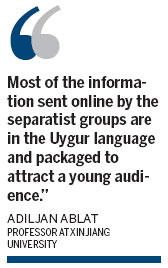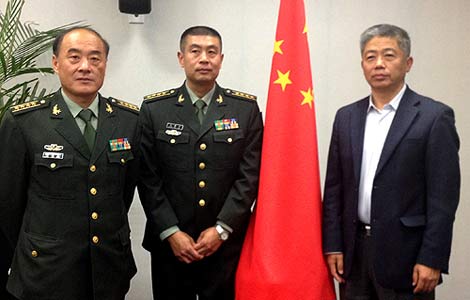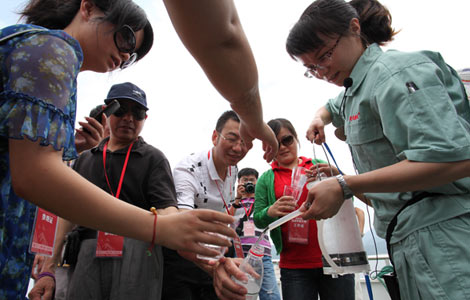Separatists spreading terror skills over Net: expert
Updated: 2013-11-05 07:21
By Cui Jia in Urumqi (China Daily USA)
|
||||||||
The Internet and social media are the main channels and tools for "East Turkistan" separatists to promote their beliefs among young people in the Xinjiang Uygur autonomous region, an expert said.
"The separatists, which seek independence for a so-called Eastern Turkistan, believe that once they gradually influence young people, they can achieve their goal of separating China. As the Internet becomes more and more popular in Xinjiang as its economy develops, it has provided convenience for separatists to spread their ideas and reach out to a greater audience," said Adiljan Ablat, a professor of politics and public management at Xinjiang University.
By the end of 2012, Xinjiang had 9.6 million Web users, of which about 44 percent are from ethnic groups. About 67 percent of ethnic users between the ages of 21 and 35 prefer and are used to receiving information over the Internet rather than through traditional media, he said.
The professor said the separatist organizations target Web users in China by sending mass e-mails through proxy servers. People who want to access the organizations' information use the servers to download the information from their websites mainly based in the United States and Europe that are blocked by the Chinese government because of illegal content.
The professor said there are also links to extreme content posted in forums and discussion panels on Chinese websites. Some of the links are disguised as jokes in a forum.
They also use micro blogs and WeChat to spread information to create tension between people from different ethnic groups and thereby create the impression that their goal of separating China is reasonable.
Separatist organizations also use the Internet to send commands and provide training materials to carry out attacks, Adiljan added.

The Ministry of Public Security has said that the East Turkistan Islamic Movement, one of four terrorist organizations related to "Eastern Turkistan" forces, uses the Internet to teach terrorism skills, such as making explosives. In May 2011, the organization called on extremists and terrorists to carry out attacks on the Chinese government in a video posted on the Internet.
Meng Jianzhu, chief of the Commission for Political and Legal Affairs of the Communist Party of China Central Committee, said on Thursday that ETIM, which is also listed as a terrorist organization by the United States and the United Nations, was behind the terror attack in Beijing's Tian'anmen Square.
Two people were killed and 40 others injured on Oct 28 when Usmen Hasan, his mother Kuwanhan Reyim and his wife Gulkiz Gini, arrived from Xinjiang and drove a jeep into a crowd at the square after crashing into a guardrail on the Jinshui Bridge, which spans the Forbidden City moat.
On Monday, Hong Lei, spokesman for the Ministry of Foreign Affairs, strongly opposed the Western media's linking of the incident to China's ethnic and religious policies even though Chinese authorities confirmed it was an organized and premeditated terror attack by separatists.
"Most of the information sent online by the separatist groups are in the Uygur language and packaged to attract a young audience, such as mixing their messages into the hottest pop songs," Adiljan said.
More than 15,000 websites are registered in Xinjiang, but only 400 of them are in ethnic languages such as Uygur, Kazak and Kirgiz, according to the region's information office.
Ablat Amut, who manages basbas.cn, a Uygur Web portal founded in 2007 in Urumqi, said the most popular sections are the forum and news sections, which generate 150,000 to 200,000 hits a day.
"We closely monitor posts on the forum, and we will warn users if they spread harmful and illegal information," the 33-year-old said.
Gao Bo in Urumqi contributed to this story.
cuijia@chinadaily.com.cn
(China Daily USA 11/05/2013 page4)

 Blackhawks honored at White House
Blackhawks honored at White House
 Kerry denies tensions between US, Saudi Arabia
Kerry denies tensions between US, Saudi Arabia
 New York City Marathon
New York City Marathon
 Not talking trash
Not talking trash
 Training begins for weapons destruction
Training begins for weapons destruction
 Police detain swimming star for driving SUV without license
Police detain swimming star for driving SUV without license
 Nongfu Spring accuses Beijing Times of defamation
Nongfu Spring accuses Beijing Times of defamation
 Movie director Feng leaves a lasting impression in Hollywood
Movie director Feng leaves a lasting impression in Hollywood
Most Viewed
Editor's Picks

|

|

|

|

|

|
Today's Top News
Gunfire reported in New Jersey shopping mall
Obama asks supporters to save health care plan
New York Chinese Film Festival kicks off today
DuPont expands Shanghai R&D center
Merkel says US ties must not be put at risk
Opening ties with China remembered
Biden headed to East Asia
White House dismisses Snowden's clemency plea
US Weekly

|

|








